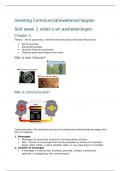Inleiding Communicatiewetenschappen
Stof week 1 video’s en aantekeningen
Chapter 1:
Theory – set of systematic, informed hunches about the way things work
Set of hunches
Informed hunches
Hunches that are systematic
Theories grow and mature over time!
Wat is een theorie?
Wat is communicatie?
Communication: the relational process of creating and interpreting messages that
elicit a response
1. Messages
Messages (or texts) are central to communication scholars
Text – record of a message that can be analyzed by others; for example,
books, films, DVDs, a silent YouTube video, or any transcript or recording
2. Ceation of messages
• A message is constructed, invented, planned, crafted, constituted,
selected, or adopted by the communicator
, • Either conscious or unconscious. But, they always
have a meaning
3. Interpretation of messages
• The receiver has to decode the message (work out, sort out, piece
together)
• Messages are polysemic—they’re open to multiple interpretations.
4. A relational process
It takes place between two or more persons
It affects the nature of the connections among those people
5. Messages that elicit a response
When communicating, it is all about the response
Effect of a commercial
Learning from a video like this
Crying about a romantic scene in a movie
Informing people in health campaign
Talking with your best friends
Definition: Communication is the relational process of creating and interpreting
messages that elicit a response.
Definition: Theory is a set of systematic, informed hunches about the way things
work.
Creating messages: A message is constructed, invented, planned, crafted,
constituted, selected, or adopted by the communicator . Either conscious or
unconscious. But, they always have a meaning.
Chapter 2:
Different perspectives on theory
1. Objective theories
2. Interpretive theories
4 dimensions
1) Ways of knowing: discovering truth or creating multiplue realities?
Objective > only one truth > the earth is round
Interpretive > deal with different questions > eating meat is bad >
depends on who you are asking (doctors or farmers)
2) Human nature: determinism or free will?
, Objective > determinism > focus on human behaviour as a consequence
of heredity and environment (nurture and nature)
Interpretive > focus on the conciour choises made by people > free will > I
decide
3) The highest value: objectivity of emancipation
Objective > finding the truth, testing hypotheses, what is
Interpretive > understanding, make the world a better place, what ought
to be
4) Purpose of theory: universal laws or interpretive guides
Objective > seeking for universal laws, but there is never complete proof
Interpretive > interpreting particular ‘texts’ and give meaning to them, not
about proving, but about understanding.
Wrap up:
• Individuals may have a preference for a more objective or interpretive approach
• Fundamental differences exist between the two theoretical positions, but they
are neither entirely separate normutually exclusive
• So, it is no “either, or” and good scholars should at least be aware of the
various
positions someone can have on the dimension objective -- interpretive
Chapter 3:
“What makes a theory good?”
Objective theory:
Standard 1: prediction of future events
o Objective theory predicts what will happen
Standard 2: explanation of the data
o Testing by gathering data and see patterns or relations, and finally
see whether these patterns fit with our hunches.
Standard 3: relative simplicity
o ‘Rule of parsimony’: given two plausible explanations for the same
event, we should first accept and test the simpler version.
Standard 4: hypotheses that can be tested
o ‘Failsifiability’: requierement that scientific theory must be stated in
a way that it can be tested and disproved if it is wrong.
Standard 5: practical utility
o Good objective theory is useful
Standard 6: quantitative research
o Most objective research depends on a comparison of differences or
testing relations: esperiment and survey
Interpretive theory:
Standard 1: clarification of values
o Brings people’s values into the open
Standard 2: new understanding of people
o Offers fresh insight into human condition
o One- of- a kind speech community
, o ‘Self- referential imperative’: researcher includes her/his own value
as it is believed impossible not to do so.
Standard 3: aesthetic appeal
o Way of capturing theories > with imaginations > clarity and artistry
Standard 4: community of agreement
o Interpretive theory must be supported by other scholars
o People should start discussing it
Standard 5: reform of society
o Interpretive theory often generates change
o Impact on society
Standard 6: qualitative research
o Textual analysis
o Ethonography: observation
Werkcollege 1
Objectieve en interpretieve docenten/ mensen hebben soms moeite om elkaar te
begrijpen. Mensen hebben uit zich zelf een bepaalde kant wat ze fijner vinden/ de
waarde van zien.
De nieuwe generatie wetenschappers zijn meer interpretatief.
Opdracht onderzoeksvragen: Hoe pak je dat onderzoek aan?
Jolanda veldhuis, docent en onderzoekt over hoe sociale media invloed heeft op
de mentale gezondheid van mensen. Wat is de invloed van sociale media op het
zelfbeeld van jongeren?
Objectief > enquête > gesloten vragen
Interpretatief > interviews > achterliggende behoeftes achterhalen
In hoeverre zijn jongeren bewust van hun zelfbeeld? In interview
achterhalen en dit toetsen en naar boven brengen.
Voordeel/ nadeel objectief onderzoek:
Efficiënt
Veel mensen
Representatiever
Statistisch meer zeggen (significant)
Je moet van te voren al een duidelijk beeld hebben en dat toetsen
Als onderzoeker moet je goed weten wat voor vervolg vragen je moet
stellen
Voordeel/ nadeel interpretatief onderzoek:
Veel minder een idee
Wat is het nou wat mensen bezighouden als hij/ zij op TikTok zit
Je hebt nog geen idee hoe het zit, maar gaat het open onderzoeken
Onderzoekende
Ontdekkingsreizigers
Zonder een duidelijk beeld
Tot nieuwe inzichten komen





